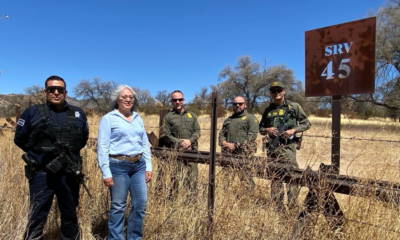budget
House Committee Greenlights Tax Breaks for Retirement Savings

Arizonans saving in tax-deferred retirement accounts may soon benefit from a state cash bonus. In a party-line vote, the House Ways and Means Committee advanced a proposal to exempt distributions up to $29,200 annually from Individual Retirement Accounts (IRAs) and 401(k) plans from state income taxes.
With the current individual income tax rate of 2.5%, married couples filing jointly could save up to $730 each year, while single taxpayers might save around half that amount. If enacted, this deduction would apply to individuals filing their 2025 state tax returns in April 2026.
Senator J.D. Mesnard, R-Chandler, champions SB1371 as a means to motivate individuals to contribute to retirement savings without facing financial penalties upon withdrawal. However, opposition from Democrats like Rep. Mariana Sandoval highlights concerns. “It’s easy to say that this will encourage savings, but for many, living paycheck to paycheck makes it difficult to invest,” she stated.
The proposed legislation is projected to slash state revenues by approximately $130 million annually. Rep. Seth Blattman called attention to this potential revenue loss, particularly while Governor Katie Hobbs seeks $122 million to sustain services for families with children who have developmental disabilities. Republican lawmakers have shown hesitancy, demanding answers regarding what they describe as budget mismanagement by the governor.
Mesnard dismissed the funding debate’s relevance to his tax-cut initiative, asserting that an $18 billion state budget affords areas to trim expenditures without jeopardizing disability program funding. Nonetheless, Blattman expressed skepticism about prioritizing retirement account incentives over urgent funded services.
Current federal and state laws permit individuals to shelter a portion of their income from taxation, primarily through IRAs. Individuals under 50 can contribute up to $7,000 annually, with an $8,000 cap for those 50 and older. Many employers also provide 401(k) options to allow employees to defer tax on a portion of their salary.
The underlying premise supports the notion that retirees generally face lower tax liabilities, which would favor withdrawals when funds are needed. However, Mesnard noted that there are no guarantees regarding tax outcomes unless the bill is passed.
Additionally, existing state tax exemptions for Social Security income and the first $2,500 of public pension income lay groundwork for Mesnard’s proposal. Originally, his bill sought to exempt all distributions after age 59½ and included provisions to exempt contributions to Roth IRAs from taxation—an approach that carried a hefty price tag exceeding $900 million.
Despite the loss projection of $130 million, proponents argue that benefits would exceed simple tax incentives. “This will attract new residents to Arizona, bolstering the economy and ensuring future retirees aren’t reliant on state resources,” stated Rep. Justin Olson, R-Mesa. The measure, having received Senate approval, is now pending a vote in the House.








![Maricopa City Council member AnnaMarie Knorr sits at the dais during a Jan. 21, 2025, meeting at Maricopa City Hall. On top: Sketches of the proposed Maricopa Towne Center, which advanced Tuesday. [Monica D. Spencer]](https://arizonanews.org/wp-content/uploads/2025/06/City-Council-Greenlights-Ambitious-184-Acre-Vestar-Shopping-Center-Rezoning-400x240.jpg)
![Maricopa City Council member AnnaMarie Knorr sits at the dais during a Jan. 21, 2025, meeting at Maricopa City Hall. On top: Sketches of the proposed Maricopa Towne Center, which advanced Tuesday. [Monica D. Spencer]](https://arizonanews.org/wp-content/uploads/2025/06/City-Council-Greenlights-Ambitious-184-Acre-Vestar-Shopping-Center-Rezoning-80x80.jpg)








